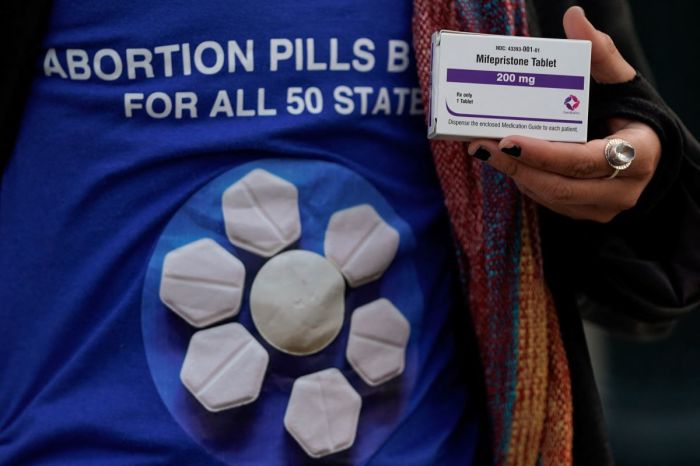
Pro-life advocates are rejoicing after a federal appeals court ruled this week that West Virginia is within its rights to ban the abortion pill, the second major court loss for the abortion industry in the last month.
A three-judge panel on the 4th U.S. Circuit Court of Appeals ruled 2-1 in an opinion published Tuesday that West Virginia can ban the sale of mifepristone, the first drug in the chemical abortion regimen.
Judge J. Harvie Wilkinson, appointed to the bench by former President Ronald Reagan, authored the majority opinion while Judge DeAndrea Benjamin, appointed to the bench by former President Joe Biden, wrote an opinion concurring and dissenting in part with the majority.
“For us to once again federalize the issue of abortion, without a clear directive from Congress, right on the heels of Dobbs, would leave us one small step short of defiance,” Wilkinson wrote, referring to the U.S. Supreme Court’s 2022 Dobbs v. Jackson Women’s Health Organizationdecision that determined that the U.S. Constitution does not contain a right to abortion.
Wilkinson disagreed with the analysis of mifepristone manufacturer GenBioPro, which sued over West Virginia’s ban and alleged that federal law granted the Food and Drug Administration exclusive authority to regulate the abortion pill. Wilkinson’s decision upholds a lower court ruling reaching the same conclusion.
In dissent, Benjamin contends West Virginia’s Unborn Child Protection Act “particularly encroaches on the federal government’s regulatory authority by criminalizing medical professionals for prescribing a medication that they are otherwise federally certified to prescribe.”
“In doing so, the UCPA ventures far beyond ‘tangentially touching the federal domain,’ as the majority claims,” Benjamin adds. “It invades the very space occupied by the federal government and reserved for federal oversight — the regulation of medication.”
GenBioPro CEO Evan Masingill claimed in a statement that the court’s ruling puts those seeking chemical abortions in “harm’s way.”
“The panel’s ruling allows states to restrict access to medications that FDA has deemed safe and effective, threatening a dangerous ripple effect on the availability of essential medications in this country,” Masingill said. “GenBioPro will not stop fighting to ensure all people can access safe, evidence-based healthcare.”
Advocacy groups and stakeholders on both sides of the abortion debate weighed in on Tuesday’s ruling.
Mat Staver, founder and chairman of the Christian conservative legal organization Liberty Counsel, called the decision a “tremendous win to help protect the lives of unborn children and women.”
“As there is no right to abortion, there is no right to dangerous abortion drugs,” Staver said in a statement Thursday. “States have the authority to ban abortion drugs that destroy innocent children and harm women.”
“While states may not weaken federal regulations, they can strengthen them to give their citizens even greater protections for their health and welfare,” he added. “We must make the womb a safe place once again.”
National Right to Life President Carol Tobias praised the ruling as “a powerful affirmation of a state’s right to protect the unborn.”
Skye Perryman, president and CEO of the progressive legal organization Democracy Forward, called West Virginia’s ban a “dubious effort by extremists to substitute political ideology for medicine and science.”
“Despite the overwhelming majority of Americans supporting the legal right to abortion, far-right politicians remain determined to severely restrict access to a critical drug that women across America depend on,” said Perryman.
“This ban harms people who seek medication abortion in West Virginia — and sets a dangerous precedent regarding access to other evidence-based health care that FDA has deemed safe and effective. Access to federally approved medication should not depend on one’s zip code but unfortunately today’s decision creates that reality for many.”
The 4th Circuit ruling comes weeks after the U.S. Supreme Court ruled that states have the authority to strip Planned Parenthood, the country’s largest abortion provider, of federal Medicaid funds.
Katie Brown Xavios, executive director of the American Life League, said states “now have full reign to defund Planned Parenthood, and as a result of the 4th Circuit ruling against a major abortion pill manufacturer, states can now also ban the abortion pill.” She criticized “countless rogue abortion pill providers” who are “illegally shipping pills into all 50 states.”
“This summer’s two major life-affirming wins for women and their preborn children are with the states,” Xavios said in a statement.
“If we cannot rely on our federal lawmakers to protect the preborn and their mothers, then we will encourage the states to do it!”
Ryan Foley is a reporter for The Christian Post. He can be reached at: ryan.foley@christianpost.com
















